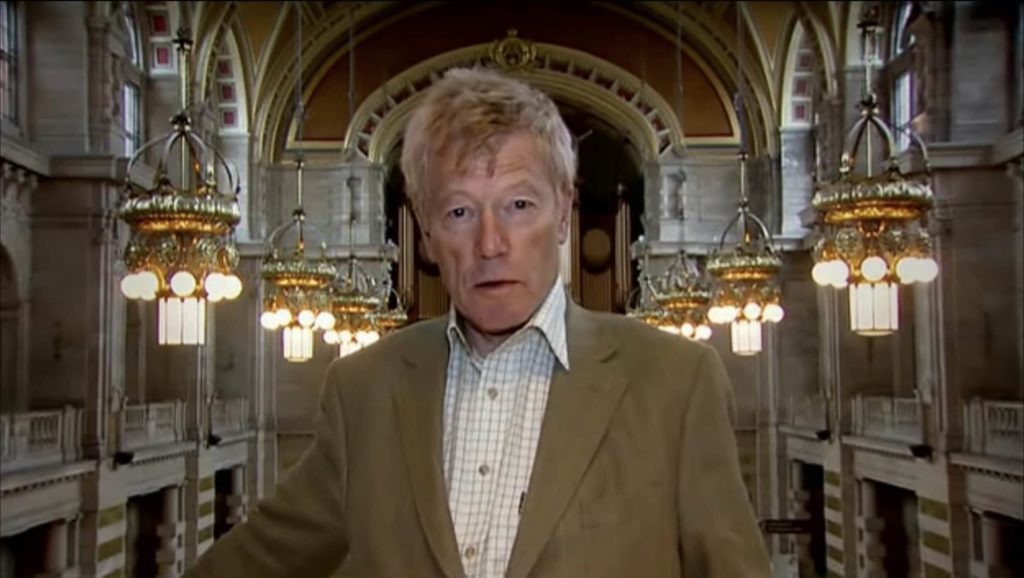
The late Sir Roger Scruton, in a still from the opening of the 2009 documentary, “Why Beauty Matters,” directed by Louise Lockwood and produced by Andrew Lockyer.
PHOTO: COURTESY OF LEONARDO FACCIONI VIA VIMEO.
The work of Dalmacio Negro Pavón reveals that politics cannot be understood without anthropology: the various conceptions of humanity throughout history are not mere theories but paradigms that have shaped the lives of peoples and conditioned political thought.
Attempting to expound someone else’s thought is always a high-risk endeavor. But since I recently declared Dalmacio Negro Pavón the most significant political thinker in Spain in recent decades, with all due caution, I will outline what I consider to be some of the interpretive keys to Negro Pavón’s thought.
“Nigel, you are definitely not one of the ‘woke,’” retorted the British historian Tom Holland to Nigel Biggar, Regius Professor of Moral and Pastoral Theology at the University of Oxford and a canon of Oxford’s Christ Church Cathedral, when the latter posited a hypothetical situation in which he was a ‘wokester’ accusing another person of ‘impure’ political thoughts. Biggar’s point was that puritanical Christians might be more restrained in condemning others for sin, since we are all sinners, while today’s secular ‘woke’ Volk are, at bottom, hypocrites quick to find fault in others while admitting to none of their own.

A still from a video of Tom Holland and Nigel Biggar during a lively exchange after the former’s lecture, given as part of the Roger Scruton Memorial Lecture series at the Sheldonian Theatre at the University of Oxford.
PHOTO: ROGER SCRUTON MEMORIAL SERIES.
The crowd filling Oxford’s Sheldonian Theatre laughed as it settled into a discussion between the two scholars, following Holland’s lecture, titled “Puritanism and Iconoclasm,” delivered October 20. This was the second in a four-part inaugural series—free to the public upon registration and ticketing via Evite—of the Roger Scruton Memorial Lectures, which is grouped around the overarching theme of “Nation and Civilization.”
Biggar—an outspoken enemy of ‘wokeness’ who has dared, in our iconoclastic age, to argue that the British Empire was not entirely bad and nothing modern Britons should feel guilty about—has been a victim of no fewer than three workplace cancellation campaigns. He stood his ground before ‘woke’ mobs of students and colleagues who called him a bigot and a racist; won Oxford’s support for his free speech rights; and observed that several vicious critics among his colleagues have received generous fellowships funded by other “imperialists” and are thus in no position to moralize against him. For his fortitude, Biggar justifiably believes, he was appointed CBE (Commander of the British Empire) in Queen Elizabeth II’s July 2021 birthday honors for services to higher education.
Hearing the banter, listening to Holland’s astute lecture dissecting ‘woke’ ideology as a perverse product of tensions in Christian thought, and absorbing the nice things being said about the late Sir Roger Scruton, conservative who died last year at age 75, created a surreal experience in what is arguably the world’s leading university town. Marred by campaigns against modern non-conformists like Biggar, iconoclastic movements against objectionable commemorations of such figures as Cecil Rhodes, and de-platforming protests intended to stop controversial figures from appearing, Oxford has resisted going ‘full woke,’ in part thanks to pressure from the British government, whose members include many graduates.
Yet it has made enough compromises to cause concern to anyone who truly cares about free speech. That marvelous October evening, however, was not protested or disrupted in any way or even, to the best of my knowledge, threatened by any form of protest or objection. Both Holland’s lecture and the post-lecture discussion with Biggar received thunderous applause and unfolded in perfectly civilized fashion (as lectures generally did in the pre-woke era, which is still in living memory).
To be fair, the University of Oxford is not officially hosting the series. The Sheldonian Theatre—a Restoration jewel built in the 1660s to host Oxford graduation ceremonies— has a significant amount of autonomy and can be booked for weddings, parties, and other private events. Despite its name, it was not used as an actual performance space until 2005 when, perhaps fittingly, Arthur Miller’s The Crucible was performed there.

A view of the interior of the Sheldonian Theatre at the University of Oxford.
PHOTO: COURTESY OF DILIFF, LICENSED UNDER CCA-SA 3.0 UNPORTED.
After Sir Roger’s death last year, a group of his friends and admirers—led by Cambridge philosophy of religion lecturer James Orr—gathered enough funds to present three years’ worth of lecture series, with the eventual goal of building an endowment that would fund them in perpetuity. I could attend only Holland’s lecture, but the series began on October 18 with the world-renowned historian Niall Ferguson, who spoke on the future of the English-speaking countries with Michael Gove, currently Britain’s Secretary for Housing and Communities. More than six hundred people attended (also without incident).
The lectures resumed the week of October 25, with the Syrian architectural writer Marwa Al-Sabouni in conversation with Douglas Murray and Ike Ilje on the subject of beauty and home. She was followed on October 27 by the historian of the Middle Ages and former Chief Justice Lord Sumption, who will talk about democracy with the legendary newspaper editor Lord Moore.
The choice of Oxford was deliberate. Despite Sir Roger’s immense reputation, brave human rights activism, undisputed status as a public intellectual, and massive scholarly output—which includes more than 50 books—his recognition at Oxford was scant. His bold supporters have delivered a powerful message: that conservative thinkers and ideas will finally have a space there. Long may it last.